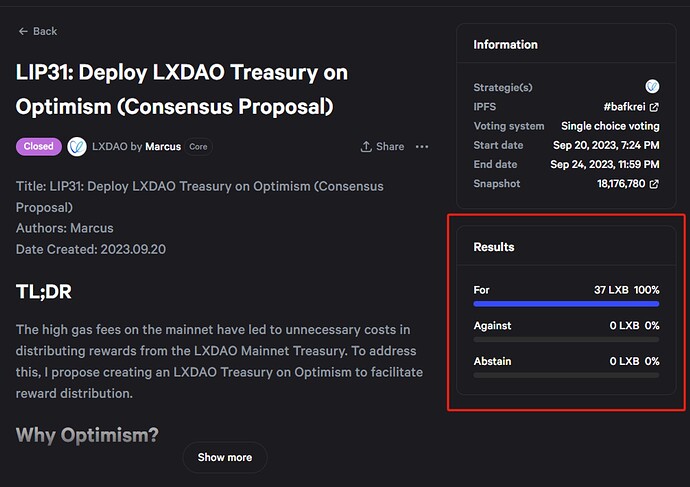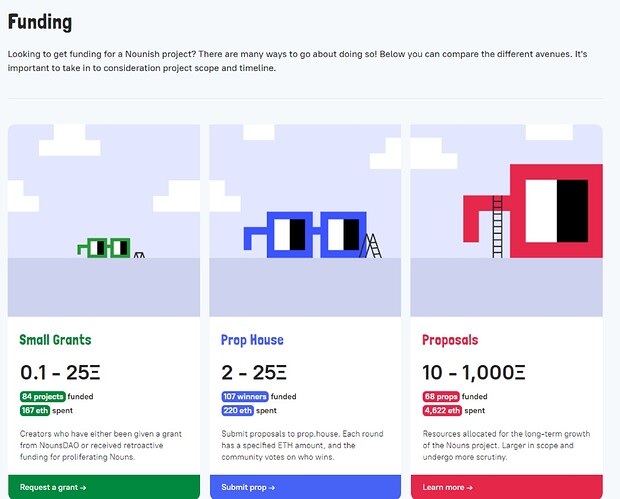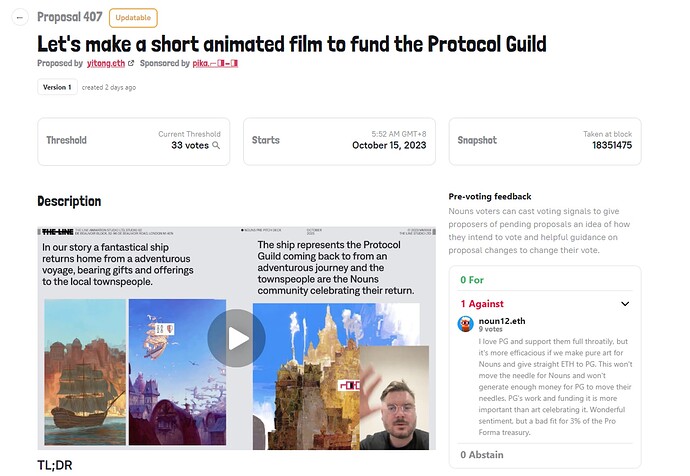TL;DR
In the previous consensus-level proposal to create the optimism treasury, the proposal received an overwhelming majority of buidler cardholder votes, but failed to meet the 70% consensus-level vote threshold, so the proposal was not passed
[LIP31: Deploy LXDAO Treasury on Optimism (Consensus Proposal)]
Number of votes in favour: 37, needed to reach 70% consensus level proposal rule (65*0.7=45.5 votes)
Proposal Status: Not Adopted
Description
This is a consensus-level proposal that involves the creation of a treasury and the relocation of treasury funds, etc. It needs to reach a 70% turnout, so that the majority of buidler card holders agree to it.
According to our observation, the creation of optimism is a good proposal for LXDAO as a whole, as it solves the problem of issuing Gas fees from the treasury, and at the same time, we can have more connections with optimism in turn, as our strategic direction of public goods and optimism’s direction of development are highly overlapping, and it is also completely in line with the concept of RetroPFG.
We presented this idea at the community meeting before the snapshot proposal was released, and it was supported by most of the members present.
We didn’t get a single negative vote on the proposal, which was mainly due to some buidler card holders not participating in the vote and not enough active governance.
In the case of a good proposal that is clearly aimed at the community, but ends up being voted down because the consensus level threshold is not met, this seems to me to be a governance burden, for which I propose some research on consensus level proposals and some ideas for fixing them
Before fixing it, here’s some research on the governance of DAOs related to public goods
What is a consensus-level proposal
Consensus level voting criteria should be used for proposals that have reached consensus level, such as proposals for the replacement of the treasury, a large migration of treasury funds, and the redesign of governance powers
Consensus level proposals should be labelled ‘Consensus Proposal’ in the proposal terminology, and consensus level proposals should be discussed and confirmed in at least 2 community meetings.
Instead of adopting the rule of dynamic threshold, Consensus Level adopts the following rule
Voting Threshold: 70%
Number of votes in favour of the proposal: ≥ 50%
Optimism Governance
Optimism has a tiered governance of proposals and requires a minimum quorum of 30 per cent, with different thresholds for approval, ranging from 51 per cent for general types of proposals, such as governance fund allocations and treasury appropriations, to 76 per cent for consensus-level proposals, such as agreement upgrades and inflation rate adjustments (3/4).
All v0.3 governance proposals must fall within one of the following categories:
- Governance Fund
- Protocol Upgrade
- Inflation Adjustment
- Director Removal
- Treasury Appropriations
- Rights Protections
- Elections
- Ratification
- Reflection Period
The different requirements for submission and approval of each Proposal Type are summarized below. If a specific template is not specified below, proposals should follow this standard proposal template. Additional proposal types may be added in future Seasons.
All Mission Applications are processed by either an elected Grants Council or the Foundation. Mission Applications should follow the process outlined on each individual Mission Request.
| Proposal Type | Proposing House | Description | Submission Requirements | Vote Duration | Quorum | Approval Threshold | Veto Threshold | Veto Rights |
|---|---|---|---|---|---|---|---|---|
| Governance Fund | Token House | The Governance Fund may be used to support development of the Collective and/or growth of the ecosystem. | Forum + On-Chain Voting | Two-week review period plus one week voting window | 30% | 51% | N/A | N/A |
| Protocol Upgrade | Token House | Scheduled changes to the on-chain smart contracts comprising the mainnet Optimism protocol | Forum + On-Chain Voting | Two-week review period plus one week voting window | 30% | 76% | TBD | Citizens’ House |
| Inflation Adjustment | Token House | Changes to the inflation rate of newly minted OP (currently capped at 2% annually) | Forum + On-Chain Voting. Proposals should follow Inflation Adjustment Proposal Template - Policies and Templates 📌 - Optimism Collective. | Two-week review period plus one week voting window | 30% | 76% | TBD | Citizens’ House |
| Director Removal | Token House | Removal of a director of the Optimism Foundation | Forum + On-Chain Voting | Two-week review period plus one week voting window | 30% | 76% | N/A | N/A |
| Treasury Appropriations | Token House | The amount of OP the Optimism Foundation may spend or distribute annually, beginning in Year 2 of its existence (the Year 1 budget is 30% of the initial total OP supply) | Proposals to be initiated by the Foundation | Two-week review period plus one week voting window | 30% | 51% | N/A | N/A |
| Rights Protections | Token House | OP holders must consent to any changes to the founding documents of the Optimism Foundation, if those changes would materially reduce their rights | Proposals to be initiated by the Foundation | Two-week review period plus one week voting window | 30% | 51% | N/A | N/A |
| Code of Conduct Violation | Token House | The Token House may vote on violations of the Code of Conduct - Accountability 🗂️ - Optimism Collective that pertain to Security Council Delegate Suspensions or Grant Misusage. All other Code of Conduct violations will be processed by the Code of Conduct Council, subject to veto by the Token House as outlined in the Council Charter. | Proposals to be initiated by the Foundation in response to reported violations | Two-week review period plus one week voting window | 30% | 51% | N/A | N/A |
| Grant Clawback | Token House | A locked grant may be clawed back before distribution for failure to execute on critical milestones, as defined by proposers and documented publicly | Forum + On-Chain Voting | Two-week review period plus one week voting window | 30% | 51 | N/A | N/A |
| Council Dissolution | Token House | A persistent Council may be dissolved if it is no longer fulfilling its Charter | Forum + On-Chain Voting | Two-week review period plus one week voting window | 30% | 51 | N/A | N/A |
| Ratification | Token House | Ratification of governance documents | Proposals to be initiated by the Foundation | Two-week review period plus one week voting window | 30% | 51 | N/A | N/A |
| Reflection Period Proposals (including elections) | Token House | Experiments with new governance structures, programs, and/or processes | Proposals to be initiated by the Foundation | Two-week review period plus one week voting window | 30% | 51 | N/A | N/A |
The Proposing House column will be updated to include Citizens’ House, for relevant proposal types, when those proposal types become valid in the Citizens’ House
A Token House Governance proposal will be approved if it meets the following minimum voting thresholds
-
Quorum: Measured as a percentage of the total supply of voteable OPs at the start of the voting period.
Minimum number of OP votes (including abstentions) associated with the proposal. In this context, quorum “voteable supply” means the total amount of OPs that have been delegated and are available to vote.
-
Approval Threshold: Measured as the number of approval votes as a percentage of the total number of votes in favor/against the proposal. Approval Threshold for each proposal is measured as the number of approval votes as a percentage of the total number of votes in favor/against the proposal. *This does not include abstentions
-
Veto Threshold: The minimum number of OP votes required to oppose a proposal, measured as _a % of the total supply of OPs available to vote at the start of the voting period.
NounsDAO Governance
NounsDAO classifies grant proposals into three categories
Small Grants: Funding in the range of 0.1 to 25 E, it is run by a group of NounsDAO members and is a “flexible pool” that can be deployed when a project is time-sensitive, the request is too small for an official proposal, or retroactive funding is needed because the work has already been done. Unlike retro, which is a retroactive award for projects that have already been produced, it is an advance on projects that need funding.
Prop House: In Prop House, creators submit their ideas as bids to win an ETH auction. Each round specifies the number of winners for a specific ETH amount. Anyone can submit their idea as a proposal. At the end of the round, community members vote on their favourite proposals for funding.
Proposals: 10e~1000e, voted by all nouns holders, based on dynamic threshold rules
Introduction to dynamic threshold rules:
(Dynamic thresholds are almost identical to our normal proposal voting rules for LXDAO)
Nounsdao Ongoing Ballots
Why optimism and NounsDAO as research?
optimism and nounsDAO are both DAOs with strong support for the public goods sector, and their governance design has a lot of references for our idea change. In the previous research of the governance team, we have studied the governance structure and voting rules of many other DAOs, such as makerdao, cruve, cultdao, etc., but we chose optimism and nounsdao, which are consistent with the public goods sector, as our governance design references due to the different attributes of the DAOs and communities. Due to the different attributes of DAOs and communities, we chose optimism and nounsdao, which are consistent with the public goods domain, as our reference for governance design.
Based on this
I would like to modify the rules for consensus-level proposals as follows
Lower the voting threshold: from 70% to 50%.
Also adopt a dynamic threshold voting rule
According to this rule, a consensus-level proposal, under extreme conditions, will not pass as long as a quarter of the people vote against it, which greatly increases the weight of the opposition, and the need to get the majority to convince the opposing side, but of course, according to our Onboarding approach, we believe that in the face of a good proposal that is good for the community, there will not be this kind of ‘spoilers’ come into play.
-
- I agree that the voting threshold for consensus-level proposals should be reduced to 50 per cent and that dynamic threshold rules should be adopted.
-
- I do not agree that the voting threshold for consensus-level proposals should be lowered to 50 per cent.
-
- I think the idea needs to be refined



